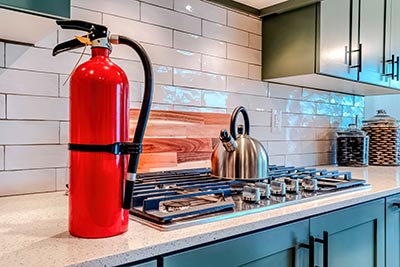
Any emergency can leave even the best of us paralyzed and numb. Regarding household emergencies, the stakes are even higher as you live with your loved ones and worry about their safety. A home emergency raises a thousand questions about who to call and what to do.
Each type of emergency requires a response accordingly. If we take a deep breath and analyze and think through our problems, the solution is usually right in front of our eyes. Here are the top household emergencies and the best responses.
As we just discussed, the circumstances surrounding the emergency dictate the appropriate course of action in the face of adversity. Therefore, it is crucial to be aware of your surroundings and find the most appropriate response.
Kitchen fires spread by grease
Your kitchen catching fire from the spread of grease has got to be the most common safety hazard in any household. The tiniest hiccup in the kitchen while cooking can lead to a massive fire, and if you have a smoke alarm, things can get out of hand instantly. Putting out a grease fire with water is the absolute worst idea since it usually splashes around the grease even more and makes matters worse.
The appropriate response to this hazard is simply covering the greasy fire with a metal lid. Once the area is deprived of oxygen, the fire will automatically die down. If the fire is in a very small area, you could always put it out with baking soda or plain flour as well. You might be able to get your food back, but at least you’ll save your kitchen from burning down.
Out of control toilet overflow
Toilets overflowing has got to be the most unpleasant and distasteful emergencies to face. If we don’t look out for the constant running of water into the toilet via the septic tank, it will stop draining itself at one point. Once there is a large amount of water entering the toilet seat with zero drainage, there will be an overflow.
The first step is closing the main valve behind the toilet seat to shut the water flow. Once you clean around, look for the main source of the issue. The fill tube and float are usually the main reason the water tanks go faulty. If you can’t figure out the issue yourself, it is always a good idea to call someone for emergency plumbing services.
Leaking ceiling
Leaks from the ceiling are often common in moist environments. However, a leaked water source can make matters worse. The first course of action in a ceiling leak is to stop water spread by placing a bucket or plastic sheet underneath. The next step is to get to the main source of the leak. We can usually track those via the attic or any other cavity space in the wall.
If you think the leak is via a small source like a broken pipe that is easily fixable, deal with it yourself promptly. If the main leak seems too complicated to fix or is not obvious right away, it is best to call an experienced professional! The quicker you try to respond to the urgent situation, the more you’ll minimize the damage.
Broken window glass
Heavy rain or kids playing cricket in the neighborhood make for broken windows every other day. Instead of getting alarmed, it is best to cover your hands with thick gloves and clean the broken glass mess. Once you’ve assessed the damage, slowly remove all broken and jarred glass from the surface to the window frame.
Before replacing the glass, the initial step can be to cover the open window with a plastic sheet and tape. You should tape over a number of layers of plastic sheets or bags to make a strong layer. At last, call your window repair guy, and you’ll most likely have a replaced window glass within a day or two.
Broken and burst pipes
In case of any broken pipes, big or small, your first step should be turning off the main water valve. There’s usually one big main water supply valve that spreads water flow throughout the house. If you close that down, it’ll make your job easier. This will minimize the water damage and give you ample time to carefully take care of the broken pipes.
Once you inspect the broken pipes and the damage, you must take care of the damage by either professional help or yourself. Freezing pipes often burst during winters, and if you’re facing this issue, it is best to go for pipe insulation. Word of advice to all is to turn off your water supply from the main source whenever you leave the house for a long duration. You never know what kind of damage you might have to deal with when you get home.
Conclusion
We’re faced with all kinds of emergencies at home every day, and our response time and decisions make a difference in the impact these emergencies have on us. If we take too long to deal with the simplest problems, we can make matters far worse for ourselves. Consider asking around for help instead of tackling the problem alone.
It is a good habit to try and deal with day-to-day problems ourselves, but it is wiser to seek professional help around the house. If we keep making DIY changes around the house, they are more likely to cause problems than professional solutions. The internet is available to most of us with only a single click, and if you’re too overwhelmed to think of a solution for yourself, you could always google what to do.
Story by Muhammad Ali










